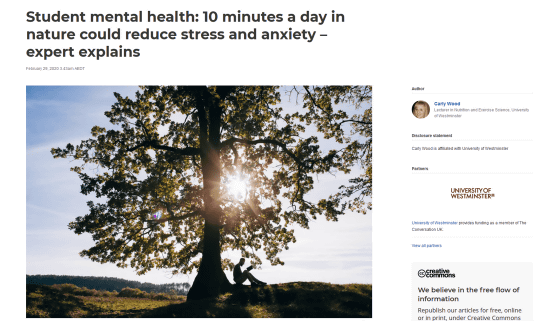Research results that mental state may be improved by spending about 10 minutes a day in nature

In modern society, not only members of society but also university students are feeling strong stress, and there is a
Frontiers | Minimum Time Dose in Nature to Positively Impact the Mental Health of College-Aged Students, and How to Measure It: A Scoping Review | Psychology
https://www.frontiersin.org/articles/10.3389/fpsyg.2019.02942/full
Student mental health: 10 minutes a day in nature could reduce stress and anxiety – expert explains
https://theconversation.com/student-mental-health-10-minutes-a-day-in-nature-could-reduce-stress-and-anxiety-expert-explains-132633

In recent years, studies have shown that contact with nature
Many college students are suffering from mental problems, but college students spend a lot of time indoors studying and giving lectures and are hard to get in touch with nature. Researchers looking at the effects of nature on the spirit have focused on figuring out how much time can be spent in contact with nature to help improve mental and physical health. They are starting to apply.
One study found that spending about 20 to 30 minutes each with nature about three times a week can effectively reduce the secretion of the stress hormone cortisol . Another study reports that touching nature for about 120 minutes a week feels better and increases euphoria.
However, these studies focused mainly on adults and did not investigate the mental health of college students. Researchers at Cornell University and the University of Maryland then conducted a study to determine the minimum time to interact with nature needed to improve college students' mental status.

The research team focused on 14 studies conducted by university students living in Japan, the United States, and Sweden that compare the change in mental health between urban and natural environments, and the spirit that comes into contact with nature Was analyzed for its impact on The “natural environment” in these studies did not necessarily include nature reserves and forests, but also included parks in urban areas and nature on university campuses. In addition, a total of 706 university students participated in the study analyzed, and the age group was 15 to 30 years old.
Analysis shows that sitting or walking in a natural setting for only 10 to 20 minutes a day can improve heart rate and blood pressure, lower cortisol, improve mood, and reduce anxiety. It turns out that it can be done. This result suggests that by incorporating contact with nature into everyday life for only 10 minutes, university students may be able to gain mental health. It can be helpful in setting policies.
On the other hand, in this study, many of the sample subjects were male college students in Japan, and it was unclear whether the subjects had mental problems at the time of the study. In addition, because the benefits of physical activity performed in the natural environment have not been investigated, and the bias and quality involved in each study have not been taken into account, the reliability of the overall study remains questionable.

Related Posts:
in Science, Posted by log1h_ik







